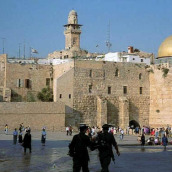Posted in News
When the Lions don’t Roar

By David Nissan
The abduction and forced conversion of the Christian schoolgirls in Nigeria in mid-April, and the visit of the Pope to the region last week, focused a much needed spotlight on the plight of the Christian populations in the region.
All over the world, there are religious groups that are discriminated against and even persecuted in various degrees, but there is no doubt that the place where Christians suffer the harshest form of persecution is the Middle East, the birthplace of Christianity. The biggest threat to Christians in the Middle East and North Africa, most of them Eastern Orthodox Christians, is from extremist Islamic militants who feel that they are once again facing a Christian military, political and cultural crusade led by the United States in the aftermath of 9/11. And while the Christian population in the region has been decreasing steadily for a long while – because of persecution and also lower birth rates compared to the Muslim population, the turmoil and the political vacuum caused by Arab Spring has only accelerated the process. For example, 70 years ago, the city of Bethlehem was 85% Christian; today, it’s down to 20%. More than 100,000 Christians left/fled Egypt in the past two years; 80% of Iraq’s Christians fled the country since the 1980’s. In Syria, hundreds of thousands of Christians have fled or have been displaced in the three years of civil war. Christians feel threatened, and this is the trend in every single country in the region with the notable exceptions of Israel and Jordan.
Religious tolerance is certainly not the norm in this part of the world. And while manifestations of intolerance among the extremist fringes of the population are almost expected, I feel that the main problem is the silence, stuttering and impotence of the mainstream political and religious authorities in the face of violent acts perpetrated by extremists. It is painfully clear that the only way to deal successfully with extremism – any form of extremism – is to confront it forcefully with zero tolerance. It is the responsibility of the mainstream powers in the system to take a clear and unequivocal stand against the fanatics, and declare the abuse of minority rights and freedoms as being illegitimate and unacceptable – not through feeble protests and condemnations but by concrete and resolute action. But perhaps it is unrealistic to expect Saudi Arabia, which is considered by many to be the mainstream spiritual leader in the Muslim world, to raise its voice against religious extremism and intolerance when in Saudi Arabia itself, Islam is not just the official religion, it is the only permitted religion and public freedom of worship is not tolerated.
The problem is the silence of the lions when their roars need to be heard the most. What is necessary is a loud, clear, unambiguous and uncompromising voice, sounded by all relevant authorities at the local, regional and international level, assertively condemning the violation of minority rights, and more importantly calling for firm action against all extremist violators. While the real test in a democracy is not only the rule of the majority but rather the steadfast protection of the rights and liberties of minorities, this is a principle that should be demanded from non-democratic governments as well.
It seems that this is not only a local problem, and that a wave of intolerance is sweeping the world today. We saw this recently in the results of the elections to the European Parliament last week where extremist groups have increased their power in almost every single member state.
Seeing the spiritual leaders of the three major monotheistic religions gathered in one place – the Holy Land – last week made me think about how much blood was spilt needlessly over the centuries, here and in other places, because of religious zealots. Unfortunately, religious extremists and fanatics are definitely alive and kicking today, and they continue to espouse and perpetrate blind violence against other human beings whose only fault is not praying to a different God, but rather praying to the same God, differently.
David Nissan is a Middle East and Iran Specialist and Public Speaker.
